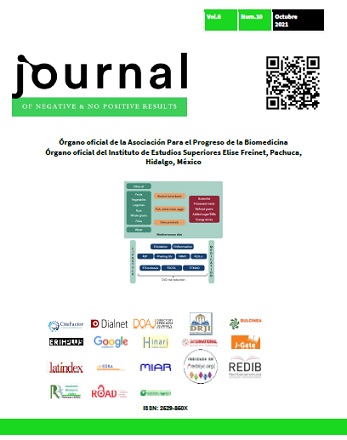Use of social networks and risk of suffering from TCA in young people
DOI:
https://doi.org/10.19230/jonnpr.4322Keywords:
Social networking; Eatings disorders; YouthAbstract
Aim. The following research tries to verify if there is a relationship between the use of social networks and the risk of developing an Eating Disorder in young people.
Method. The design was relacional transversal. 108 young people between the ages of 18 and 30 were surveyed online and anonymously. The survey was composed of the Eating Attitudes Test-26 instrument and questions elaborated by the researchers on the use of social networks and health.
Results.The results showed a significant relationship between the frequency of use
of social networks and have a negative experience in the use of them, with the risk of suffering from an Eating Disorder.
Conclusions. After this research we can conclude that the use of social networks can be a risk factor for the development of an Eating Disorder, although more research is necessary.
Downloads
References
IAB Spain. Estudio anual redes sociales 2020 [IAB Spain]. Madrid: IAB; 2020 [2021]. Disponible en: https://iabspain.es/download/39688/
American Psychiatric Association. Diagnostic and statistical manual of mental disorders. 5 ed. Washington: APA; 2013.
Portela de Santana, M. L., da Costa Ribeiro Junior, H., Mora Giral, M., y Raich, R. M. La epidemiología y los factores de riesgo de los trastornos alimentarios en la adolescencia: una revisión. Nutrición hospitalaria. 2012; 27(2), 391-401.
González Gómez, J., Madrazo del Río-Hortega, I., Gil Camarero, E., Carral Fernández, L., Benito González, M. D. P., Calcedo Giraldo, J. G., et al. Prevalencia, incidencia y factores de riesgo de los trastornos de la conducta alimentaria en la Comunidad de Cantabria. Revista Med Valdecilla. 2017; 2(1).
Martínez, M. Á. C., y Berengüí, R. Diferencias de personalidad y en variables psicológicas relacionadas con el riesgo de trastornos de la conducta alimentaria. Anales de Psicología/Annals of Psychology. 2020; 36(1), 64-73.
Martínez-González, L., Fernández Villa, T., Molina de la Torre, A. J., Ayán Pérez, C., Bueno Cavanillas, A., Capelo Álvarez, R., et al. Prevalencia de trastornos de la conducta alimentaria en universitarios españoles y factores asociados: proyecto uniHcos. Nutrición Hospitalaria. 2014; 30(4), 927-934.
Chacón, G., Angelucci, L., y Fernández, T. Influencia de la insatisfacción con la imagen corporal, índice de masa corporal, autoconcepto físico, y sexo sobre las conductas alimentarias de riesgo en estudiantes universitarios. Psicología Tercera Época. 2015; 34(1), 109-135.
Saunders, J. F., y Eaton, A. A. . Snaps, selfies, and shares: how three popular social media platforms contribute to the sociocultural model of disordered eating among young women. Cyberpsychology, Behavior, and Social Networking. 2018; 21(6), 343-354.
Wilksch, S. M., O'Shea, A., Ho, P., Byrne, S., y Wade, T. D. The relationship between social media use and disordered eating in young adolescents. International Journal of Eating Disorders.2020; 53(1), 96-106.
Restrepo, J. E., y Castañeda Quirama, T. Riesgo de trastorno de la conducta alimentaria y uso de redes sociales en usuarias de gimnasios. Revista Colombiana de Psiquiatría. 2020; 49(3), 162-169.
Wick, M. R., y Keel, P. K. Posting edited photos of the self: Increasing eating disorder risk or harmless behavior?. International Journal of Eating Disorders. 2020; 53(6), 864-872.
García Guardiola, I. Trastornos de la conducta alimentaria y redes sociales. Una perspectiva del siglo XXI. Madrid: Comillas Universidad Pontificia; 2020.
Puertas, D. G. Influencia del uso de Instagram sobre la conducta alimentaria y trastornos emocionales. Revisión sistemática. Revista Española de Comunicación en Salud. 2020; 11(2), 244-254.
Lozano, Z. B. La familia y las redes sociales en los trastornos alimenticios en adolescentes de la época contemporánea. In Crescendo. 2012; 3(2), 307-320.
Arseniev-Koehler, A., Lee, H., McCormick, T., y Moreno, M. A. #Proana: Pro-eating disorder socialization on Twitter. Journal of Adolescent Health. 2016; 58(6), 659-664.
Published
Issue
Section
License
All accepted originals remain the property of JONNPR. In the event of publication, the authors exclusively transfer their rights of reproduction, distribution, translation and public communication (by any sound, audiovisual or electronic medium or format) of their work. To do so, the authors shall sign a letter transferring these rights when sending the paper via the online manuscript management system.
The articles published in the journal are freely used under the terms of the Creative Commons BY NC SA license, therefore.
You are free to:
Share — copy and redistribute the material in any medium or format
Adapt — remix, transform, and build upon the material
The licensor cannot revoke these freedoms as long as you follow the license terms.
Under the following terms:
Attribution — You must give appropriate credit, provide a link to the license, and indicate if changes were made. You may do so in any reasonable manner, but not in any way that suggests the licensor endorses you or your use.
NonCommercial — You may not use the material for commercial purposes.
ShareAlike — If you remix, transform, or build upon the material, you must distribute your contributions under the same license as the original.
No additional restrictions — You may not apply legal terms or technological measures that legally restrict others from doing anything the license permits.

This work is licensed under a Creative Commons Attribution-NonCommercial-ShareAlike 4.0 International License

























